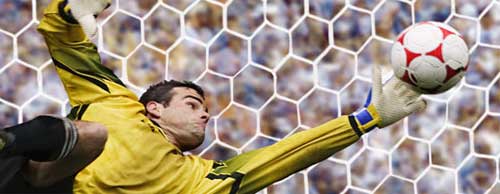Ten Soccer Goalie Tips
In this article by Stewart Flaherty learn ten key factors to being a good goalkeeper.
1 Shot Stopping
Shot stopping is the obvious task for every goalkeeper. You must develop the ability to catch balls coming at you, and making dives to either side. Ensure your hand reaches the goal post after each dive to either side. Practice diving saves on a regular basis, asking a teammate to shoot 50 balls to you on either side.
2 Distribution
Distribution is a crucial element for a goalkeeper. A goalkeeper not confident or skilled in distribution can be a huge problem for a team. Not only can your team struggle to hold possession you will create turnovers that award the opposing team possession in dangerous areas of the field. Good distribution can keep possession for your team and clear the ball from your defensive third. Quick and accurate distribution from a goalkeeper can start counter attacks for your team.
3 Reading the Game
Being aware of the game as it develops is a vital skill for every goalkeeper. Look at your central defenders and ensure both forwards are covered. Check your full backs are covering and goal side of attackers, before checking for runners untracked from midfield. Check these factors as the ball crosses the halfway line, it is too late to make adjustments if you start looking while the ball is in shooting range. Even when your team is in possession, check positioning and prepare for any adjustments that must be made after a turnover.
4 Communication
If you notice attacking players uncovered communicate early and clearly to your defenders in order to make the correct adjustments as a team. Do not shout cover generically, you are talking to nobody and nobody will react. Identify the defender who should adjust and address them by name before giving instruction.

5 Deal with Crosses
Whether they are from open play or set pieces, you must develop the ability to deal with crossed balls into the penalty area. Be decisive and come to get the ball or stay on line to save a shot, communicate your decision clearly to your defense. Knowing your intentions will promote clarity and confidence in your back line.
6 Recognize a Breakaway
There are times as a goalkeeper when your back line will simply be beaten and you find yourself facing a 1 v 1 situation. You must recognize these situations and come off your line to pressure the attacker. Pressuring the forward will narrow the angle available to shoot, and also could force them into an early and rushed shot.
7 Stay Big
This is important when facing shots, and in 1 v 1 situations. Goalkeepers who go to ground or dive too early allow a composed forward the easy opportunity to lift a ball over them and into the goal. Read the body language of a forward and stay upright spreading arms to create a formidable barrier.
8 Display Mental Toughness
Mental toughness is a commonly cited requirement for goalkeepers, but what is it? Simply put, mental toughness is the ability to focus on your task and perform to the fullest for 90 minutes. You must forget errors and display composure when your team is under pressure. Communicate to your teammates in a confident tone and do not criticize. If you show signs of frustration and panic, you can guarantee it will spread throughout your team.
9 Start Counter Attack
Goalkeepers have the ability to begin dangerous counter attacks that can threaten the opposition. The opposition team will never be higher up the field than when you have the ball. If a goalkeeper can distribute quickly and accurately then your team will often find favorable matchups further up the field.
10 - Do Not Criticize
The ability to stay composed is a vital skill for a goalkeeper. Many goalkeepers develop the habit of criticizing defenders after a goal is conceded. If you do this it is a negative habit you should cease immediately. Criticism can not only lessen your own work ethic, making you believe you are not to be blamed and have no need to improve. Criticism can also create divides between you and your teammates.
